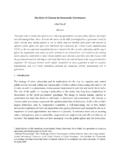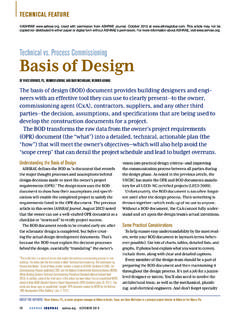Transcription of RECOMMENDATION OF THE COUNCIL ON …
1 RECOMMENDATION OF THE COUNCIL ON R EGULATORY policy AND GOVERNANCE2012 The mandate of the regulatory policy Committee is to assist members and non members in building and strengthening capacity for regulatory quality and regulatory reform. The regulatory policy Committee is supported by staff within the regulatory policy Division of the Public governance and Territorial Development Directorate. The OECD Public governance and Territorial Development Directorate s unique emphasis on institutional design and policy implementation supports mutual learning and diffusion of best practice in different societal and market conditions. The goal is to help countries build better government systems and implement policies at both national and regional level that lead to sustainable economic and social development. For more information on regulatory policy , please visit our website at: or contact Nikolai Malyshev or Gregory Bounds OECD regulatory policy Committee1 FOREWORD BY THE OECD SECRETARY-GENERALThe global financial and economic crisis has uncovered major failings in governance and regulation, which have undermined trust in public and private institutions alike.
2 Amid ongoing economic uncertainty, establishing a well-functioning national regulatory framework for transparent and efficient markets is central to re-injecting confidence and restoring growth. This RECOMMENDATION of the COUNCIL of the OECD on regulatory policy and governance is the first comprehensive international statement on regulatory policy since the crisis. The RECOMMENDATION : provides governments with clear and timely guidance on the principles, mechanisms and institutions required to improve the design, enforcement and review of their regulatory framework to the highest standards; advises governments on the effective use of regulation to achieve better social, environmental and economic outcomes; and calls for a whole-of-government approach to regulatory reform, with emphasis on the importance of consultation, co-ordination, communication and co-operation to address the challenges posed by the inter-connectedness of sectors and economies.
3 The OECD regulatory policy Committee, whose mandate is to assist Members and partner countries to build and strengthen capacity for regulatory quality and reform, has developed this piece of regulatory guidance, building on a robust assessment of over a decade of OECD experience in implementing systematic regulatory reform. The RECOMMENDATION was developed over a twelve-month period through extensive engagement with civil society, TUAC, BIAC, OECD Committees and the OECD Secretariat. This new OECD RECOMMENDATION represents the insight, acknowledgement and political will of Member countries to promote better regulatory policies for better lives. I encourage Members to use the RECOMMENDATION actively, and implement it to support effective government, as well as promote the development of more prosperous, inclusive and green societies. Angel Gurr aSecretary-General of the OECD2In the shadow of the global financial crisis, the importance of sound regulatory frameworks has become more evident than ever.
4 Good regulation is essential if our economies are to function efficiently, while meeting important social and environmental goals. However achieving good regulation is a demanding task and one that is never over. This new RECOMMENDATION of the COUNCIL on regulatory policy and governance is the fruit of careful assessments of best practice identified by the regulatory policy Committee through a decade of reviews of OECD countries. It represents a maturing of thinking and learning from experience in this complex policy area. The RECOMMENDATION develops a systemic governance framework that can deliver ongoing improvements to the quality of regulations. It provides governments with advice on the development of institutions and the application of regulatory management tools. It also provides practical measures or benchmarks against which countries can assess their capacity to develop and implement quality regulation.
5 Participants at the international OECD Conference on regulatory policy : Towards a New policy Agenda in October 2010, conscious of the increased importance of good regulation to meeting the challenges all countries now face, called for new principles to guide regulatory policy . The RECOMMENDATION of the COUNCIL on regulatory policy and governance was developed by members of the regulatory policy Committee in the ensuing months. In addition to discussions within the committee there was broad public consultation on drafts of the RECOMMENDATION . The RECOMMENDATION will provide the basis for a clearer dialogue with members and non-members about the policies, practices and institutions needed for systemic improvements to regulatory quality. It will facilitate the development of benchmarking practices, and provide a framework for advice to countries seeking to implement better regulatory governance where capacity is currently low.
6 As the incoming Chair of the regulatory policy Committee, it is a privilege to have the opportunity to support and commend this Banks AOChair, regulatory policy Committee, OECDC hairman, Productivity Commission, AustraliaFOREWORD BY THE CHAIR OF THE OECD regulatory policy COMMITTEE3 RECOMMENDATION OF THE COUNCIL ON regulatory policy AND GOVERNANCETHE COUNCIL ,HAVING REGARD to Articles 1, 2a), 3 and 5b) of the Convention on the Organisation for Economic Co-operation and Development of 14 December 1960;HAVING REGARD to the RECOMMENDATION of the COUNCIL on Improving the Quality of Government Regulation [C(95)21/FINAL], including the OECD Reference Checklist for regulatory Decision-Making ; HAVING REGARD to the 1997 OECD Report on regulatory Reform [C/MIN(97)10 (summary) and C/ MIN(97)10/ADD], the 2005 Guiding Principles for regulatory Quality and Performance [C(2005)52 and CORR1], the APEC-OECD Integrated Checklist for regulatory Reform [SG/SGR(2005)4], and the RECOMMENDATION of the COUNCIL on Competition Assessment [C(2009)130]; NOTING the considerable progress made by Members and non-Members to improve the quality of regulation and of the tools and institutions for evidence-based decision making; NOTING that the challenges facing governments today and in the foreseeable future include issues and problems with a regulatory dimension that have not been addressed systematically in previous OECD decisions, recommendations and principles.
7 RECOGNISING that democracy and the rule of law depend upon and reinforce sound regulatory frameworks; RECOGNISING that regulations are one of the key levers by which governments act to promote economic prosperity, enhance welfare and pursue the public interest;RECOGNISING that well-designed regulations can generate significant social and economic benefits which outweigh the costs of regulation, and contribute to social well-being; NOTING that regulatory policy as a government policy framework for how regulations are made, assessed and revised should be carried out at the highest level by the office of the President or Prime Minister and calls for good governance practice to be implemented across departments and levels of government;4 RECOGNISING that the financial crises and economic cycles, innovation, social change, environmental challenges and the search for new sources of growth highlight the importance of regulatory frameworks for well-functioning markets and societies and of regulatory policies and institutions to cope with the inter-connectedness of sectors and economies;RECOGNISING that the OECD has played a leading role in the international community to promote regulatory reform and the implementation of sound regulatory practices on a whole-of-government approach; and,RECOGNISING that the regulatory policy Committee was created in 2009 to assist Members and non Members in building and strengthening capacity for regulatory quality and reform;On the proposal of the regulatory policy Committee:I.
8 RECOMMENDS that Members: 1. Commit at the highest political level to an explicit whole-of-government policy for regulatory quality. The policy should have clear objectives and frameworks for implementation to ensure that, if regulation is used, the economic, social and environmental benefits justify the costs, the distributional effects are considered and the net benefits are Adhere to principles of open government, including transparency and participation in the regulatory process to ensure that regulation serves the public interest and is informed by the legitimate needs of those interested in and affected by regulation. This includes providing meaningful opportunities (including online) for the public to contribute to the process of preparing draft regulatory proposals and to the quality of the supporting analysis.
9 Governments should ensure that regulations are comprehensible and clear and that parties can easily understand their rights and obligations. 3. Establish mechanisms and institutions to actively provide oversight of regulatory policy procedures and goals, support and implement regulatory policy , and thereby foster regulatory Integrate regulatory Impact Assessment (RIA) into the early stages of the policy process for the formulation of new regulatory proposals. Clearly identify policy goals, and evaluate if regulation is necessary and how it can be most effective and efficient in achieving those goals. Consider means other than regulation and identify the tradeoffs of the different approaches analysed to identify the best approach. 5. Conduct systematic programme reviews of the stock of significant regulation against clearly defined policy goals, including consideration of costs and benefits, to ensure that regulations remain up to date, cost justified, cost effective and consistent, and deliver the intended policy Regularly publish reports on the performance of regulatory policy and reform programmes and the public authorities applying the regulations.
10 Such reports should also include information on how regulatory tools such as regulatory Impact Assessment (RIA), public consultation practices and reviews of existing regulations are functioning in Develop a consistent policy covering the role and functions of regulatory agencies in order to provide greater confidence that regulatory decisions are made on an objective, impartial and consistent basis, without conflict of interest, bias or improper Ensure the effectiveness of systems for the review of the legality and procedural fairness of regulations and of decisions made by bodies empowered to issue regulatory sanctions. Ensure that citizens and businesses have access to these systems of review at reasonable cost and receive decisions in a timely As appropriate apply risk assessment, risk management, and risk communication strategies to the design and implementation of regulations to ensure that regulation is targeted and effective.
















